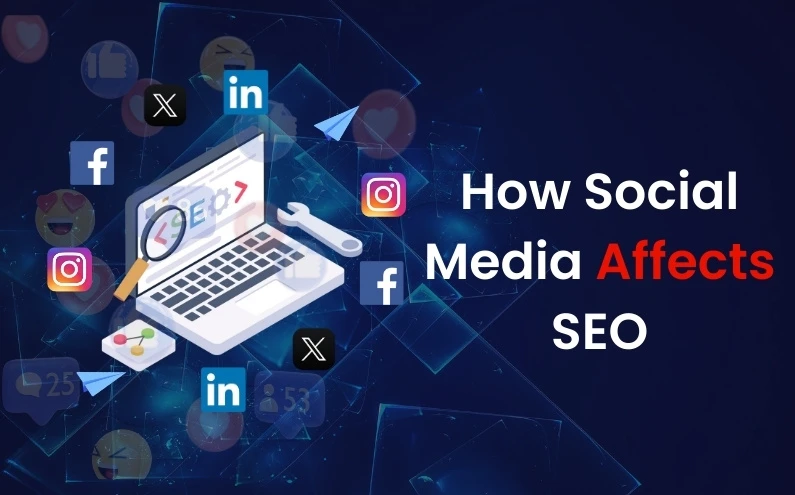The Indirect Impact of Social Media On SEO
1. Increased Traffic
One of the most apparent ways social media impacts SEO is through increased website traffic. When a business shares content on social media platforms like Facebook, Twitter, Instagram, or LinkedIn, it can drive users to their website. Increased traffic can signal to search engines that a website is popular and valuable, potentially improving its ranking. Moreover, social media profiles themselves can rank in search engine results, offering additional pathways for users to discover a brand.
2. Content Distribution And Visibility
Social media is an effective medium for disseminating content. By sharing blog posts, articles, videos, and other forms of content on social platforms, businesses can reach a broader audience. This increased visibility can lead to more shares, comments, and interactions, amplifying the content’s reach. Resonant, high-quality content has a higher chance of being shared by people, which can spread the word and increase the number of backlinks—an essential component of SEO rankings.
3. Enhanced Brand Recognition And Authority
Having a strong social media presence promotes authority and brand recognition. When users frequently see and interact with a brand on social media, they are more likely to recognize and trust it. This trust can translate to increased click-through rates (CTR) when users encounter the brand in search engine results. Additionally, a well-recognized brand is more likely to earn backlinks from other reputable websites, further boosting its SEO efforts.
4. Improved Indexing
Search engines use web crawlers to index content on the internet. While social media links themselves may not directly impact a website’s SEO, the activity generated around these links can. When content is widely shared and discussed on social media, it can attract the attention of web crawlers, leading to faster indexing. Fresh content that gets indexed quickly has a better chance of ranking well in search results.
Social Signals And SEO
Social signals refer to the collective engagement metrics a piece of content receives on social media, such as likes, shares, comments, and overall interactions. Social signals can affect SEO in a number of ways even though they are not a direct ranking factor.
1. Correlation With High-Quality Content
Content that garners significant social engagement is often high-quality and valuable. High social media involvement is a sign of high-quality content, and search engines want to provide users the best results possible. While correlation does not imply causation, there is a strong association between high social engagement and higher search engine rankings.
2. Enhanced User Interaction And Visit Duration
Social media can drive engaged visitors to a website. These users are more likely to spend time reading, interacting with, and exploring the site. Metrics such as average session duration, pages per session, and bounce rate are essential indicators of user engagement that search engines consider when ranking websites. High user engagement signals to search engines that the content is relevant and valuable, potentially leading to improved rankings.
3. Content Freshness And Relevance
Social media platforms thrive on fresh, timely content. Sharing new content on social media can drive immediate traffic and engagement, signaling to search engines that the content is relevant and current. This freshness factor can positively impact SEO, especially for time-sensitive topics or trending subjects.
Strategies To Leverage Social Media For SEO
1. Create Shareable Content
To maximize the SEO benefits of social media, businesses should focus on creating high-quality, shareable content. This includes blog posts, infographics, videos, and other formats that provide value to users. Content that resonates with the audience is more likely to be shared, increasing its reach and potential for backlinks.
2. Optimize Social Media Profiles
A brand’s search engine visibility can be improved by optimizing social media profiles. This entails constantly updating profiles with new content, maintaining consistent branding across platforms, and utilizing pertinent keywords in profile descriptions. A well-optimized social media profile can appear in search results, providing additional visibility and driving traffic to the website.
3. Encourage Social Sharing
Encouraging social sharing is crucial for amplifying content reach. Businesses can include social sharing buttons on their website, create compelling calls-to-action (CTAs), and engage with their audience to foster a community of brand advocates. Engaged followers are more likely to share content, increasing its visibility and potential SEO benefits.
4. Monitor And Analyze Performance
Regularly monitoring and analyzing social media and SEO performance is essential for understanding what works and what doesn’t. Tools like Google Analytics, social media analytics platforms, and SEO tools can provide valuable insights into traffic sources, user behavior, and engagement metrics. Future plans can benefit from these insights, which can also help to maximize social media and SEO initiatives.

